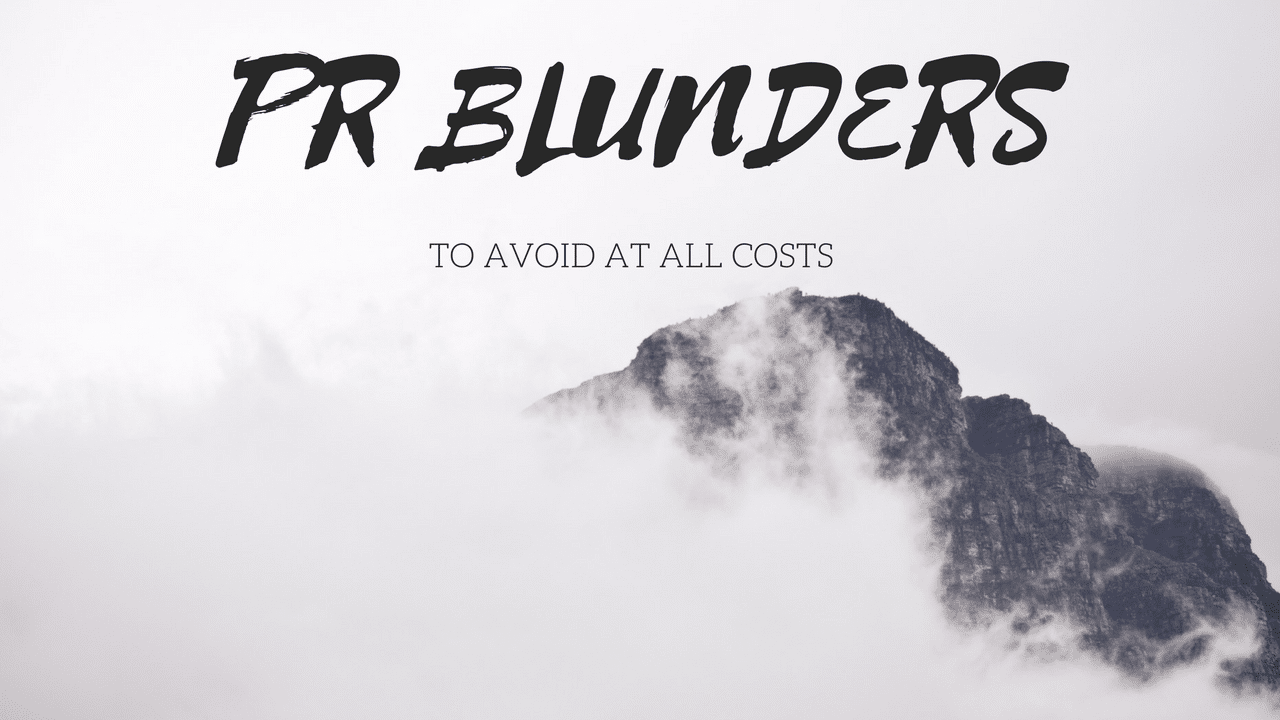
When you’re doing your own PR, mistakes will happen. That doesn’t always mean you’re headed for a crisis, but it can certainly hurt your chances of getting the publicity your company needs. It can also mean that the publicity you get isn’t the sort of publicity you want. Here are a few major blunders that you should avoid at all costs.
Making reporters uncomfortable
Reporters and bloggers are your gateway to publicity. Without their goodwill, you won’t receive coverage unless you’ve done something so newsworthy they can’t avoid covering it.
The fastest route to a reporter’s blacklist is to make them feel harassed.
Don’t:
- Email repeatedly in the span of a few days to make sure they got your message.
- Track down their personal contact information so you can call them at home.
- Direct your social media followers to fill their mentions with your big news.
- Talk to them like a close friend – keep it professional.
- Offer payments, dinners, gifts or favors in exchange for coverage (aside from any access they may need to cover your tours or news).
- Suggest that there will be any sort of negative consequence if they fail to provide you with coverage.
- Find them in person anywhere but their offices, stalk them on social media, or otherwise invade their personal boundaries.
Escalating a crisis
If your company is publicly criticized, the best answer is to respond humbly and attempt to address the situation in a helpful or positive way. If that isn’t possible, then weather the storm as best you can. The worst way to handle this type of crisis is to make the crisis even bigger and more public.
Don’t:
- Publicly argue with critics.
- Try to undermine your critics in the public eye.
- Allow your defensiveness to take over.
- Shift the blame to another party.
- Try to hide or cover up your mistakes once they’ve been pointed out.
- Allow or encourage your employees to defend your company in public disagreements — unless that’s their job.
- Continue to fan the flames of a crisis after it’s started to die down.
Being too humble
Yes, it’s important to be humble in a crisis. The rest of the time, excessive modesty will hurt you. If you want publicity, you need to be willing not only to talk about your company, but to convince people that its newsworthy.
Don’t:
- Leave important information out of your press releases or pitches.
- Wait around hoping that reporters and bloggers will come to you.
- Assume reporters already know about your company — even if you’ve spoken in the past.
- Post your news on your social feeds or company website and wait for someone to pick up the scoop.
- Conversely, leave all news and important information off your social feeds and company website.
- Try to tease reporters with less information than they need.
Being too controversial
“All publicity is good publicity” has always been a questionable aphorism, but today it’s especially untrue. If you draw too much of the wrong kind of attention, you could wind up dealing with an angry public, online harassment, aggressive reviews and even hacking attempts. Even people with intentionally provocative personas usually wind up facing negative consequences, so don’t try to cultivate a controversial brand unless you have a great PR team that’s prepared for a crisis.
Don’t:
- Plan PR stunts designed to outrage people.
- Associate your brand with fringe politics.
- Use your brand’s public platforms for controversial or political jokes or opinions.
- Infringe on the rights of your customers.
- Publicly attack, insult or joke about marginalized groups.
Ignoring the mistakes others have made
We hear about major PR blunders and crises in the news all the time. When you’re handling your company’s PR without the help of professionals, it’s important to watch out for those mistakes and consider where they went wrong.
Here’s a list of some of the biggest PR failures of 2016 — if you can do better than these folks, you’re doing something right.





